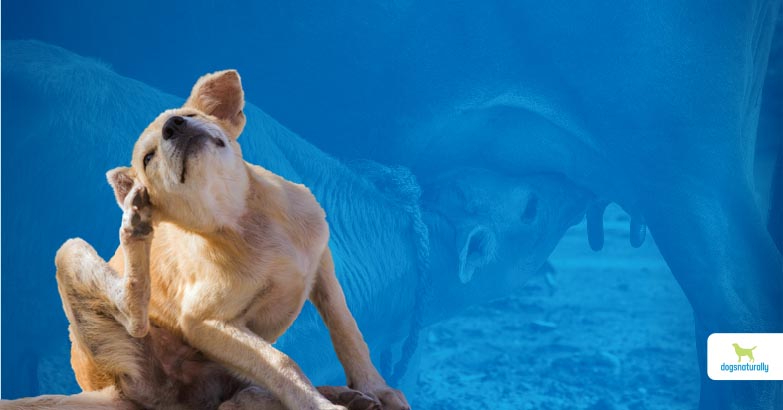It’s spring and that means dog allergies. The good news is that there’s a simple supplement that could help relieve your dog’s itchy skin or snuffly nose.
And that supplement is colostrum. There are more than 1,000 clinical studies on the benefits of colostrum. And a lot of those studies examine colostrum’s role in preventing and relieving allergy symptoms.
So before you run out and stock up on antihistamines for your dog … try bovine colostrum for dog allergies. Let’s see how nature’s first food can help your dog this allergy season.
What Is Colostrum?
Colostrum is the first milk that mammals produce right after giving birth.
The colostrum in breast milk is full of nutrients. It’s about half protein … and it’s rich in fat, vitamins and minerals that help young animals grow.
Colostrum helps develop the newborn’s immune system. That’s because it contains vital antibodies that protect young animals from bacteria and viruses. It’s why infants who aren’t breastfed have weaker immune systems. And it’s also why they get more allergies … they missed out on colostrum.
Colostrum for dogs can offer the same benefits to adult animals too.
How Colostrum Helps With Dog Allergies
When your dog’s immune system is out of whack, it can react to substances (like fleas, food or grass) that it shouldn’t. So improving your dog’s immune system is an essential part of resolving allergies. Colostrum contains 2 important substances that can help with your dog’s allergies: PRP and antibodies.
RELATED: More health benefits of colostrum for dogs …
1. PRPs Boost The Immune Response
Colostrum’s PRP content is its claim to fame. PRP stands for proline-rich polypeptide. PRPs are the component in colostrum that regulates the immune response.
PRPs are short chains of amino acids that can down-regulate an overly active immune system that causes allergies. They stimulate a proper response to toxins, bacteria or allergens by controlling the cytokine response. Cytokines are inflammatory immune cells.
Here’s how it works …
PRPs help the thymus gland release factors that regulate immune functions. They help shift a humoral immune response (which produces antibodies to disease) … to a more protective cell-mediated response (which kills off diseased cells).
This is called a TH2 to TH1 shift. Over-production of TH2 cytokines leads to allergies. It also activates and releases mast cells that cause itchy skin. The shift helps limit inflammatory cascades that are common with allergies and sensitivities. And that helps curb allergy symptoms.
This also means PRPs have anti-inflammatory effects … reducing the impact of histamines that get released with allergies. And finally, PRPs are antioxidant.
Research shows they can reduce the damage from free radicals and oxidized fats in cells. (Free radicals are damaged cells that steal from other cells in your dog’s body … and they can cause long term harm.)
Luckily, PRPs aren’t species-specific. So colostrum for dog allergies can come from other species such as cows, sheep or goats. The most common form is bovine colostrum, from cows.
2. Antibodies Help Form Your Dog’s Immune System
Normally your dog makes his own antibodies to disease using his immune system. But your dog can also benefit from passive immunity, which is when he receives the antibodies.
Bovine colostrum is rich in antibodies that form part of your dog’s passive immunity. The antibodies (or immunoglobulins) in bovine colostrum include IgA, IgM and IgG. Both IgA and IgG antibodies play a key role in allergies …
Immunoglobulin G (IgG) Antibodies give young animals passive immunity until their immune system matures. These antibodies can bind to viruses and pathogens to neutralize them.
IgG antibodies can also bind to and neutralize allergens.
Studies also show IgG antibodies from bovine colostrum can prevent gastrointestinal (GI) infections. And they can support the gut lining and help with LPS-induced inflammation. LPS (lipopolysaccharide) is an endotoxin that can cause an immune reaction in your dog. This has important implications for leaky gut, which you’ll read about in a bit.
RELATED: Leaky gut may explain why your dog’s allergy meds don’t work …
Immunoglobulin A (IgA) Antibodies are another important class of antibodies. Your dog makes more IgA antibodies than any other kind.
IgA antibodies don’t circulate in the blood like other antibodies do. These special antibodies live in the mucosal surface of the intestines … where they regulate the immune system.
IgA antibodies can prevent the growth of pathogenic (bad) bacteria. And research shows they can also help grow beneficial bacteria.
Colostrum also contains lactoferrin, a protein that can act as a prebiotic and feed good bacteria in the gut. And that leads to another benefit of colostrum …
Colostrum Helps Prevent Leaky Gut
One of the main functions of colostrum is to build a healthy gut in newborns. After all, nearly 90% of the immune system lies in the gut. So a healthy gut leads to a healthy body.
Colostrum can support gut health in adult animals too … by helping to manage leaky gut.
Leaky gut happens when the gut lining gets damaged. This damage has many causes: shifts in bacteria populations, toxins, stress and drugs. Drugs like antibiotics are especially problematic.
In leaky gut, the cells lining the digestive tract become inflamed and start to pull apart. This leaves spaces between the cells where undigested food particles and toxins can leak into the bloodstream.
That starts a cascade of inflammation that increases your dog’s risk of chronic health issues … including allergies and food sensitivities.
Remember LPS from earlier? In leaky gut, LPS can pass into the blood. It then travels to the organs … and spreads the endotoxins throughout the body. And that can lead to chronic inflammation, allergies and chronic disease.
How Colostrum Helps With Leaky Gut
Colostrum can help prevent and reverse leaky gut in two ways:
- Lactoferrin proteins can bind to LPS and other endotoxins to neutralize the inflammation they can cause.
- Colostrum provides your dog with IgA antibodies. And low levels of IgA antibodies can be a factor underlying leaky gut.
Both IgA and IgG antibodies protect the mucosal lining in your dog’s gut. Mucus forms a barrier between the bacteria and toxins in your dog’s gut … and the delicate cells lining the digestive tract.
A thick, healthy mucosal lining coats the digestive tract. It helps keep toxins and allergens inside the digestive tract … and out of your dog.
DNM RECOMMENDS: Four Leaf Rover offers Bovine Colostrum that’s rich in immune-boosting antibodies and proteins and helps promote a healthy gut and immune system. Buy Bovine Colostrum now >>
Use Colostrum Topically
When you use it topically, colostrum can help repair your dog’s skin and ease the itchiness.
Make a paste using powdered colostrum mixed with distilled water. Apply it to your dog’s skin. Pay special attention to areas that are very itchy … or have visible signs of allergies, like a rash.
So … now you see how colostrum can be a powerful addition to your dog’s diet. If your dog has environmental or food sensitivities or allergies, give it a try!
RELATED: Learn how much colostrum to give your dog for allergies …
References
Deo SS, Mistry KJ, Kakade AM, Niphadkar PV. Role played by Th2 type cytokines in IgE mediated allergy and asthma. Lung India. 2010;27(2):66-71.
Starościk K et al. Immunologically active nonapeptide fragment of a proline-rich polypeptide from ovine colostrum: Amino acid sequence and immunoregulatory properties. Molecular Immunology. 1983 Dec;20(12):1277-82.
White MV. The role of histamine in allergic diseases. J Allergy Clin Immunol. 1990 Oct;86(4 Pt 2):599-605.
Boldogh I, Liebenthal D, Hughes TK, Juelich TL, Georgiades JA, Kruzel ML, Stanton GJ. Modulation of 4HNE-mediated signaling by proline-rich peptides from bovine colostrum. J Mol Neurosci. 2003 Apr;20(2):125-34.
Ulfman LH, Leusen JHW, Savelkoul HFJ, Warner JO, van Neerven RJJ. Effects of Bovine Immunoglobulins on Immune Function, Allergy, and Infection. Front Nutr. 2018 Jun 22;5:52.
Nakajima A et al. IgA regulates the composition and metabolic function of gut microbiota by promoting symbiosis between bacteria. Journal of Experimental Medicine. 2018;215(8):2019-34.
Martelli A, De Chiara A, Corvo M, Restani P, Fiocchi A. Beef allergy in children with cow’s milk allergy; cow’s milk allergy in children with beef allergy. Ann Allergy Asthma Immunol. 2002 Dec;89(6 Suppl 1):38-43.










